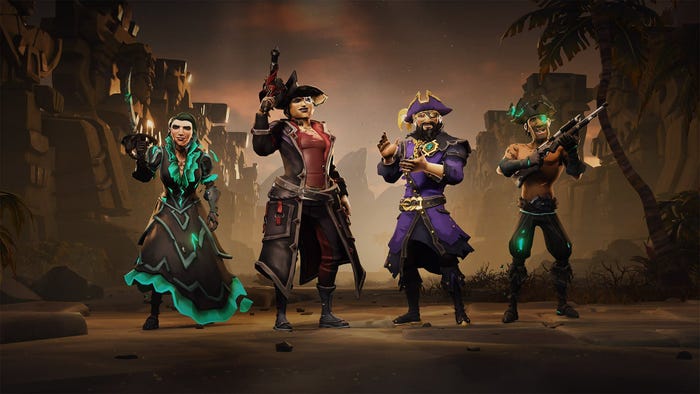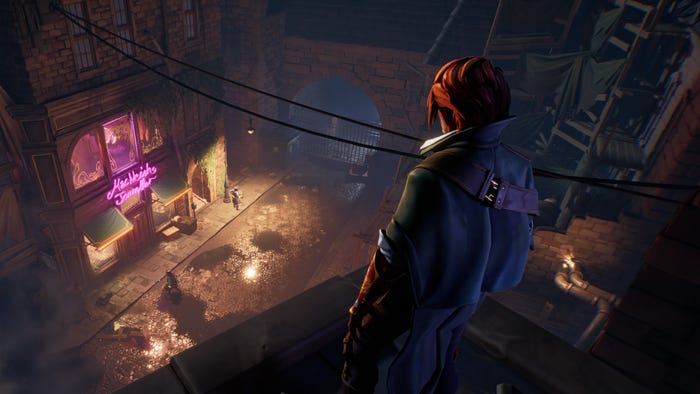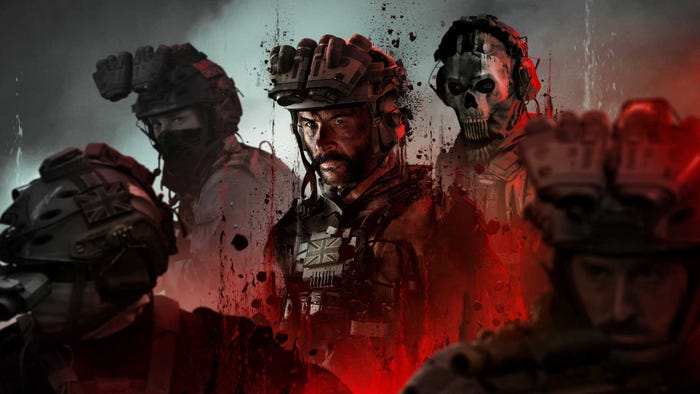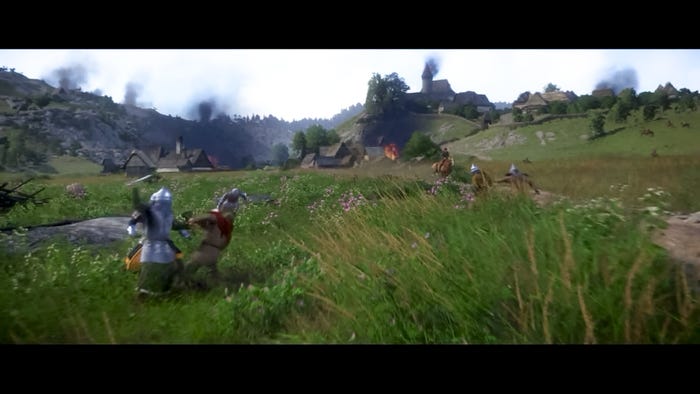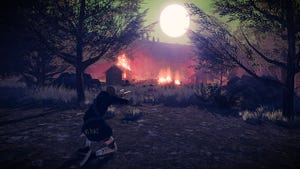
Featured Blog | This community-written post highlights the best of what the game industry has to offer. Read more like it on the Game Developer Blogs.
Australian video game developer Tantalus celebrates its twentieth birthday this year, joining a select group of independent game-makers to have reached that milestone. CEO Tom Crago takes a look back at the company's history.


Blow Out Your Candles
Tantalus turns twenty this year and while birthdays unavoidably prompt reflection, so-called milestone birthdays tend to occasion the kind of navel gazing best reserved for beer-soaked bar stools, right at the moment when the lights come on and you realise all the other stools have been stacked and you’re sitting there alone. As a corporate entity we aren’t allowed to drink in parts of America until we turn twenty-one next year, but the analogy rings apposite in that more than once in the last two decades we’ve had the stool ripped from under us, and more than once we’ve stumbled ramshackle into a metaphorical restroom, splashed water on our face, and found the mirror offering utterly nothing by way of encouragement.
So let’s navel gaze. Let me tell you a little about one of the oldest surviving game development studios in Australia and, by boxed-product sales volume, probably the most successful. I’ll also reflect upon what I’ve learned as the guy running the thing. Mostly it’s a story of survival, of bloody perseverance, very often in the face of volatility and impediments. We’ve also enjoyed the occasional bolt of good fortune and won praise for our technical acumen.
More than that though, this story is a testament to a different kind of asset: the kind that goes up the elevator in the morning and down in it at night. Our programmers, artists, designers, producers, and others have come together to produce forty-three titles since 1994. Some of our team have been with us for most of that time and many for in excess of twelve years. We’ve released sixty-two SKUs in total and have worked on every major console since the SNES. Ten of the publishers we’ve shipped games for no longer exist. It’s been a turbulent trip.
Early Days
I own Tantalus but I didn’t found the company. Here in Melbourne the videogame industry owes a collective debt to Beam Software, and the two guys who started Tantalus worked for a time at Beam before stepping into the abyss and setting up shop on their own. Andrew Bailey and Trevor Nuridin were programmers who backed their ability to build a business porting games from arcade boxes to the SNES, Saturn and PC. They were joined a little down the track by Arthur Kakouris, also ex-Beam, and Stephen Handbury, both of whom brought production expertise to the budding enterprise.
The first Tantalus title was Stargate on SNES. The team in those days comprised a small handful of guys with no artist among their number. Really Tantalus was a technology company, and so our genetic blueprint came to be fashioned. Next came work converting coin-op titles, first the critically acclaimed Manx TT Superbike, then Area 51, The House of the Dead and others, on PC and intermittently on Saturn and PSX. We also ported the Wipeout games from PSX to Saturn: a translation many thought impossible. Slowly the company grew, eventually adding an artist or two, and forming a relationship with UK-based Perfect Entertainment.

Let’s Try Something More Original
The new millennium at Tantalus began with a triad of equestrian titles, one of which (Mary-Kate and Ashley: Winners Circle) can lay an odd and probably contentious claim to featuring one of the first ‘go anywhere’ 3D environments on console. Then the company leapt at what seemed like a dream opportunity: develop a game based on the nascent but already cult television show South Park. Unfortunately the publisher of that game was Acclaim, and the turmoil associated with developing and ultimately shipping it almost killed Tantalus.
South Park Rally could constitute a case study for everything that was wrong with the videogame industry back in that era. Until someone gets around to writing that case study, it is enough to say that a highly driven group of Tantalus employees developed an original game on PC, PSX, N64 and DreamCast. In seven months. Understandably, the end product was underwhelming, and when I arrived at the company a couple of years after it shipped I said to the guys, “well, I guess at least you would have made a few bucks out of it.” Not even. The budget for all those SKUs was less than nine hundred thousand dollars.
I found out later that this sorry tale had an even sorrier twist (and I don’t mean the non-payment of royalties… that of course was a given). Turns out the guys had initially been asked to develop an E3 demo for South Park Rally as an early deliverable in the contract. No problem there, only they then discovered that another studio had also been contracted to develop the exact same game. Acclaim simply picked the demo they liked best, showed it at E3, and terminated their deal with the other group. A class act.
New Leadership
Come the end of the year 2001 I’d spent two years at Ratbag, an ex-development studio in Adelaide, working primarily as the Director of Development and willingly doing the bidding of its entrepreneurial CEO. That union ended in tears and a court case, and as I was looking around thinking about what to do next I remembered a studio in Melbourne to whom we had looked to outsource some very technical work earlier that year. The thing that had impressed me about Tantalus was their engineering smarts. At Ratbag we were really good at putting deals together, at Tantalus it was the opposite. It struck me that these guys were flailing as a business but had a handful of extremely high quality programmers, better than any I’d seen in my short career to date.
One of them was Andrew Bailey. Co-founder of the company, creator of the game Druid on C64, and the guy who gave Peter Molyneux his first gig in the videogame industry. A genius, and the heartbeat of Tantalus in terms of technology. I knew early on that, in Australia at least, he was in a league of his own. I was twenty-five years old at the time and with only a couple of years of industry experience, but I sidled into the Tantalus Board Room and explained to the owners why they should make me their CEO and give me a chunk of the company.
They bought it. I started a few weeks later and quickly realised why. By any measure, the company was insolvent. They owed more than three hundred grand to the tax department (having taken a self-prescribed sabbatical from paying tax of any kind for the past two years, including compulsory employee contributions for their staff), and had just one small Game Boy Advance deal on the books generating revenue. It was a horror show, and more seasoned CEO-elects would have turned on their heels and walked back out the door.
I was decidedly unseasoned and more than a little reckless and in any event in my first week at Tantalus Andrew Bailey showed me a GBA racing demo they’d been working on for the last few months. I was playing a lot of GBA games at the time and I remember vividly the moment I took the hardware in my hands to take my turn with the demo. Simply put, it was the most amazing thing I’d ever seen in a videogame. To this day I’ve never been more surprised, exhilarated or impressed by any act of technical wizardry. “We’ll be fine,” I thought, and got on a plane to Japan.
That demo would become the GBA title Top Gear Rally. It was published by Nintendo, won an IGN Game of the Year Award, and was a significant critical and commercial success. It put us instantly on the map as a handheld developer of note and led directly to us signing a deal with THQ to develop Monster Truck Madness. At E3 the following year one of our Producers was demoing Top Gear Rally and was approached by a senior engineer from ARM, the company that designed the chip for the GBA. Bewildered, he said it never occurred to him that the chip could be exploited in that way. We’d ultimately ship eight titles on GBA, and in terms of technology I felt like we were the best in the business.

Still Porting
Meanwhile, alongside all our handheld development, Tantalus went back to its roots and back into the porting business. We made the mildly forgettable PS2 version of Looney Tunes Space Race in 2002, along with Men in Black 2: Alien Escape on the GameCube, but then took on the more serious business of bringing Unreal II to the original Xbox. Atari had decided they wanted the game on console and asked the developer, Legend Entertainment, to do the job. “That dog’s not going to hunt,” said Legend, on the basis that the game was sluggish on PCs with twice the specifications of an Xbox. Epic themselves had serious reservations.
One of the great things about being a videogame CEO with no technical background to speak of is that you’re able to make decisions without worrying too much about things like technology. So when my friend Adam Lancman from Atari called me and asked whether we’d be interested in doing the conversion, I tuned out not long after hearing the words ‘Xbox’ and ‘Unreal.’ Sure we could do it, why the hell not? Tim Sweeney phoned me a couple of weeks later and how I was able to allay his concerns I will never know.
The reality, of course, was that Tim and Atari and everyone else involved knew that my involvement in the thing would end, in any meaningful way, as soon as the contract was signed. What they were buying was a group of developers who had proven time and time again that they could ‘do the impossible’ when it came to technical challenges of this precise nature. A group that had built its internal systems and tool chain around doing exactly this kind of work, and that prided itself on its technical brilliance. Some years prior our senior programmers found a hardware bug in the original PlayStation and flew to Japan for a week to help Sony fix it.
Bringing Unreal II to the Xbox was huge undertaking. I seriously low-balled the costing (we needed the work) and the addition of multiplayer and a handful of other new features made for a stressful development cycle. As always though, we delivered on time and on budget and in doing so became the first Australian studio to ship an online console game. In the process we impressed not only Atari but also Epic and Microsoft, and those relationships, hard forged, would prove imperative in years to come.
At around that time we formed a budding partnership with THQ. The first deal I put together over there was with Brian Christian, who was impressed by what I’d shown him of Top Gear Rally. Jack Sorensen was running production and Steve Dauterman, based here in Australia, became my chief point of contact at a publisher that was kicking goals all over the place. At one stage they had close to half a billion dollars of cash in the bank.
We developed ten titles with THQ and considered as a group they made tens of millions of dollars in profits for that company and millions of dollars for us. The relationship was equitable, respectful and professional. That’s the way it’s meant to work. Of course the business that THQ were in disappeared one day and they were a little slow to notice. We were too, but not before we’d registered some serious wins on the DS and PSP.
Happy Happy Handheld
When Nintendo first announced the DS, and once people stopped scratching their heads and wondering if they were serious, I picked up the phone and started looking for a development deal. My philosophy has always been that you’re better off having a publisher pay for your engine development on new hardware. If you can land a work-for-hire deal early on you’re perfectly positioned to self-fund something original once the installed base grows more accommodating. Fortunately THQ were ready to double down on Nintendo’s new platform and asked us which of their franchises we’d like to work on and how much it was going to cost.
Back then the biggest kids license in the world was SpongeBob SquarePants, and with a keen eye for royalties and an appetite whet by previous wins on the GBA, I decided that the little sea sponge in the pineapple house constituted the perfect companion for our maiden foray into the dual-screened deep. SpongeBob SquarePants: The Yellow Avenger was released on both DS and PSP, and sold around a million copies, mostly, I suspect, to pot-smoking college kids: a market to whom we were more than happy to cater.
At Tantalus we worked with big licenses from the day the doors were first thrown open. Our first game was Stargate on the SNES and on the road to SpongeBob we touched the likes of Woody Woodpecker, Jimmy Neutron and many others. There were times when it was painful (Legend of the Guardians: The Owls of Ga’Hoole), but mostly it was eminently manageable and genuinely exciting. Reading a script before the movie went into production, writing lines of game dialogue for a multi-billion dollar franchise: these were things that gave us a thrill, and we felt a sense of privilege to have been a part of it. We still do.
At times it was difficult to deal with the vitriol around licensed titles, not just from outside the industry but from within it. It’s extraordinary going back and reading reviews of some of those old releases. Very often reviewers would praise the gameplay, graphics, audio and all the rest before observing first that that it “just wasn’t the kind of game they were interested in playing,” and next that they “kind of wished licensed games didn’t exist at all.” Five out of ten.
Of course videogame reviewers today are a different and far more impressive animal. And yet I can’t help but juxtapose our experience in those days with the current set of problems casting a pall over our industry. I suspect it’s simply a subtle variation on the same theme. Or to put it another way, a bunch of juveniles shouting, “Fuck off, you’re wrecking videogames.” They’ll figure out eventually that the medium is big enough for all of us.
So we loved the licensing business and for us the shiniest jewel in that crown was undoubtedly Cars. We made two games across four SKUs for THQ and Pixar, and in the case of the initial offering on DS, I doubt they could manufacture cartridges fast enough. As a showcase for our technology, Cars 2: Mater-National Championship checked all the boxes, and in hindsight it marked the high point of that entire business model. It was downhill from there, as evidenced by the likes of Megamind, probably the only game we developed for THQ that didn’t make money.
Around that time we were also developing all the handheld SKUs in the MX vs ATV series, working with Rainbow Studios in Phoenix. We channelled all our racing experience into those titles and the results were mostly satisfying. Certainly it was one of the standout racing franchises on PSP. Meanwhile we shipped a title on N-Gage based, unfortunately, upon one of our better, original racing concepts. In actual fact we could probably just use that same concept again on a new game. Sales of Payload, released just as the N-Gage stumbled listlessly to its death, were miniscule.
Then came our most successful title to date. I was sitting in our Board Room in South Melbourne with Ian Livingstone from Eidos talking about the success of the DS and how we might look to develop something targeted squarely at a demographic we felt the platform had neglected. Directly across from us was a poster for Mary King’s Riding Star, an equestrian game Tantalus had made on PlayStation some years earlier. “What about horses?” said Ian, and so Pony Friends was born. It sold a million copies, spawned a sequel, and became the flag bearer for a whole new genre of handheld titles.
Pony Friends was emblematic of the special affinity we felt for Nintendo during those years, and retain to this day. Although they published Top Gear Rally on GBA, it was the pony titles as well as the Cars games that afforded us financial stability along with access to huge, mainstream audiences. Millions and millions of people played those games. We were proud, too, of never once failing a Nintendo Lotcheck submission in all those years working on GBA and DS. Never failed a submission and never missed a publisher release deadline.

Behind the Scenes
The DS and PSP were great for Tantalus. We built upon our relationship with THQ, diversified with titles for the likes of Activision and Warner Bros, and grew the company to something like seventy people. Behind the scenes, though, the stresses and strains of our dysfunctional ownership structure were beginning to take a grave toll. Tantalus had five shareholders and all five of us were Directors of the company. Three of the guys wanted to sell their shares and go and do something else, and our weekly meetings tended to end in arguments around what the business was worth and how we should go about selling it.
As the Chair of those meetings, and as the CEO of the business, I tried to keep the train on its tracks. Certainly we managed to keep up appearances externally, and for the most part we were able to clean the blood off the Board Room floor before our staff grew too suspicious. More than once I arrived at work, braced for another onslaught, to find my access-card not granting immediate admission to our building. “That’s it,” I thought, “they’ve changed the locks and I’m out.”
Eventually I did what I should have done a few years earlier. I went to a bank and asked if I could borrow around three and a half million dollars. As banks do they said, “sure. But if you don’t pay it back we’ll take your house and everything you own.” With the loan secured I went and offered the other shareholders cash for their holdings in Tantalus. We’d agreed previously on a valuation and although the process could have been smoother, to their credit the guys all accepted and the arrangement was consummated. It was a fair deal. A year later and they might have got more. Three years later and they would have got pennies on the dollar. Such is the volatile nature of our industry.
Not long after buying the business, and lumbered with a bank loan of sickening magnitude, something rather wonderful happened in the world of videogames. The Wii arrived as though heaven-sent: the perfect console for a company like ours with a history of successes on Nintendo platforms and a strong track record in the kids and licensed space. Eidos figured out what a smash hit Pony Friends was becoming and just like that we signed a six-title deal for premium, original titles to be developed over two years on the Wii and DS. It was massive, and along with everything else we had going on with THQ and others, enabled me to feel secure about cashflow into the medium term for maybe the first time in the company’s history.
We’d spoken to a few VCs and Private Equity groups over the years and with the arrival of the Wii their approaches became more regular and enthusiastic. I was introduced to Netus by one of our accountants and it was clear early on that they were a step above the rest in terms of expertise and experience. And so began the necessarily convoluted process of bringing them on as a shareholder in Tantalus and as my partner in the business. It worked out. I could repay the money I’d borrowed from the bank and look forward for the first time to a Board structure conducive to strategic decision making.
It helped that we were making a stack of money. For a couple of years profits were measured in millions, and by default we ploughed most of it back into the business. We added a layer or two to our management structure, hired more art and engineering talent, and invested in our own IP development. We tried to acquire a handful of smaller Australian development studios and opened a new office in Brisbane to better cater to publisher demand for our services. We paid bonuses and dividends, invested as never before in internal training, and produced grandiose planning documents charting a future accented by further growth. A lot of businesses were doing it at the time.
Wait... What Just happened?
Then the global financial crisis hit and things changed. I was President of the Game Developers’ Association of Australia at the time and so was concerned not just for Tantalus but for the entire industry downunder. Historically the entertainment sector had done okay during recessions, and like many people I hoped our industry would prove resilient. It did not, and looking back we now know that the world’s economic problems met head-on with some structural deficiencies within the videogame business that we probably should have noticed sooner. Add a consumer base whose preferences were shifting at a frantic pace and you have the perfect storm that near as damn it wiped out the Australian game development scene around 2009.
The majority of publisher-owned studios here closed while most of the larger independent shops went out of business. Netus, who had been fine if fastidious partners since joining me in 2007, saw which way the wind was blowing faster than most. “You should lay off about forty people, and the sooner the better,” came their advice, before even the initial cracks had grown to chasms. In ten years in the industry I’d never had to let anyone go because I couldn’t afford to pay them, and like an idiot I stubbornly refused to see sense.
Instead I set about looking for the deal that would enable me to keep everyone employed. Cruelly, one deal was all it would have taken, as we continued for a time at least to make games for THQ and within our Pony Friends franchise. At least three times in a frantic nine months I reached in-principle agreements with Publishers on deals that would have filled our pipe. They all fell through at the last minute, and a chunk of our team filled their days notionally working on original IP concepts but really worrying about the extent to which their days were numbered. The only good thing to come from that hellish year was our game Drift Street International on DSiWare, a title developed ably and under duress by our Brisbane studio.
Netus were new to the videogame industry and there were a few things they got wrong during their time as Tantalus shareholders. They were right to suggest the layoffs though. Looking back it’s great that we kept people employed for longer, helped them pay their rent and mortgages and all the rest of it, but in the end it did no one too many favours. I should have acted sooner. At least, by the time I had to call that meeting, natural attrition across our workforce meant there were less than ten staff that were given their notice. They were all paid out in full, and all had just finished up on projects. It was still my worst day at work by a considerable margin, worse even than the day I calculated the full, excruciating extent of my personal financial losses during that period.

Back to Basics
Things looked pretty grim come the beginning of 2010 and Netus decided they wanted out. I wasn’t done yet and so struck a deal to buy back their share of the business. We had no real prospects in terms of profitable development deals, the strength of the Australian dollar was crippling us, and by rights I probably should have just shut the whole thing down, but we had retained a lot of key personnel and I knew our engine technology and tool chain would continue to give us an edge. Those two things – talent and technology – had long been our hallmarks, and I hoped that by recognising past failings and shaking up the business model we might come to prosper once again.
The first thing I did was start a new label, Straight Right, to focus on core releases. The Tantalus name had grown synonymous with kids and licensed titles and I wanted us to be able to release different product under a different name. We were also plotting a move into the digital-release space. Born out of a combination of necessity and common sense, I also looked to change-up the way we interfaced with our workforce. I’d long admired the ‘project-based’ approach favoured by the film industry in that it seemed to best reflect the fickle realities of game development. Very few studios could guarantee ongoing job security and it seemed pointless to pretend we were one of them. Better to be honest about the inherent volatility in game development, make absolutely sure you can pay people for their work, and share the profits fairly with those making the greatest contribution.
Most people were happy with this new model, especially those making the games who were now earning more money and with far greater flexibility to work on their own projects externally. They were also being paid for every minute of overtime. The only group who didn’t seem to understand was the Australian Taxation Office, who insisted we return to doing things the old fashioned way. Arguing with those guys is like putting on your best clothes and trying to wrestle a current of boiling custard: painful, expensive and ultimately utterly futile. I’m convinced our industry will switch models eventually (maybe when the talent unionises or forms agency agreements) and in my view it will be for the better.
Meanwhile, we shipped our first iOS title Need for Speed Shift 2: Unleashed and started work on the Wii U version of Mass Effect 3 for our friends at BioWare. We had also signed an original IP with Ubisoft, which would become Funky Barn. They released it on 3DS and we signed a distribution deal with 505 to bring it to the Wii U as a launch title. We moved offices to a beautiful old warehouse in Melbourne’s inner north and put the finishing touches on Pony Trails, an original, self-funded title for iOS. We were smaller than when we were at the peak of our powers, but we were well and truly back in the saddle in terms of deal-flow.
At GDC that year I was at Epic’s annual dinner and when conversation turned to the Wii U. Mark Rein whipped out his phone and showed a gameplay capture of something those guys had been working on utilizing Unreal Engine 3. It was late, we’d drank a lot of wine and we were among friends, so I figured it wouldn’t hurt to show Mark the work we’d been doing on Mass Effect 3. My phone came out and I played Mark a movie we’d cut together to show BioWare that week in San Francisco.
I thought nothing more of it, until two weeks later Stephane D’Astous who was running Eidos Montreal dropped me a line. He said he’d seen part of the gameplay movie over my shoulder in the restaurant and wanted to know if we had the capacity to work on another title on the Wii U. That conversation progressed rapidly to a contract to develop Deus Ex: Human Revolution – Director’s Cut. As an example of the practical realities of deal making in the videogame business it takes some beating.

And so...
And so here we are. In Pony Trails we have a successful mobile title with more than 3,500,000 unique users. Soon we’ll launch Barnanza, also on mobile, which we rate among our best work on any handheld platform. We have another couple of original titles in development on mobile, and a big title for a major publisher on PS4, Xbox One and PC that is set for a 2015 release. There’s another thing too, which we’ll be able to talk about soon. It’s a full slate, although as always we’re looking anxiously for what’s coming next.
Game development studios, where they are remembered at all, tend to be remembered solely for the games they have developed, and sometimes just for one game. Some people, maybe even some who work for us, would say that we are yet to strike that particular brand of gold. Probably the best game we’ve made was Top Gear Rally, and that was a long time ago. Myfavourite, an original racer on GBA called Trick Star, had such a limited release that very few people were even aware of its existence. I still see kids in airports or on trains playing our MX games and doubtless we’ve made millions of little girls happy with our Pony Friends and Pony Trails titles, but most of us here still feel like we’re yet to make the big time. We’re yet to make a lasting, original mark.
That said, we take a good measure of pride in what we’ve achieved and above all we know we’ve focused first and foremost on our audience. We didn’t make the Jimmy Neutron game we wanted to play; we made a Jimmy Neutron game for fans of the show. To make games continuously for twenty years is a hell of an achievement and a credit to the two hundred or so people who have worked with us over the years. Across multiple studio spaces, three cities, in most genres, and on whatever platform made any kind of sense, we’ve retained a desire to improve and a sense of humility as content creators.
And so on reflection, standing symbolically once again before that restroom mirror, let’s raise a toast to the wins and chalk the losses up to experience. We’re still in the game, after all.
Read more about it in Flashbacks from the Flow Zone.
Read more about:
Featured BlogsAbout the Author(s)
You May Also Like



